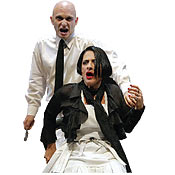
Best Musical
‘Sweeney Todd’
It shouldn’t have worked. Ten actors should not have been able to play all the roles in Stephen Sondheim’s grisly masterpiece, let alone all the instruments. Yet somehow director John Doyle and his ensemble turned this revival into a landmark of musical theater, almost making it seem like a new work. Spare orchestrations made it newly possible to appreciate the lyrics. And Doyle relied not on sets and props to flesh out the onstage world, but the imaginative faculties of the audience.
2 ‘See What I Wanna See’
On Broadway, “musical” may be increasingly synonymous with “fun for the whole family.” But at the Public, Michael John LaChiusa’s short duet of musicals—one a Rashomon-like tale of lust, violence, and deceit in Mancini-era New York, the other about a fallen priest seeking to avenge himself on a godless universe—had more than enough style and smart storytelling to overcome some odd Japanese vignettes.
3 ‘The Light in the Piazza’
There are no new tricks in Adam Guettel and Craig Lucas’s new musical about an American woman and her troubled daughter on vacation in Italy. Yet the writers find plenty of charm in the old fashions of lush music and an occasional comic twist. They’ve proved that, done right, the big, romantic tuner still has a home on Broadway.
Best Play
‘Doubt’
John Patrick Shanley’s parable about a nun trying to determine whether a priest is molesting her students is an efficient masterpiece, 90 taut minutes that reach all the way up to consider grand questions of doubt and faith and down to explore one woman’s personal torment. A smart play that’s also a hit, it’s at once thoughtful and thrilling.
2 ‘Hope Leaves the Theater,’
by Charlie Kaufman. Coming from the quirky genius behind Eternal Sunshine of the Spotless Mind and Being John Malkovich, this radio play—half of Theater of the New Ear at St. Ann’s Warehouse—was bound to be thick with self-referential trickery. But who could have guessed how moving a stage debut it would be? Kaufman’s account of a lonely woman watching and leaving a play (written “by Charlie Kaufman”) proved more inventive than a year’s worth of downtown fare, and vastly funnier.
3 ‘In the Continuum,’
by Danai Gurira and Nikkole Salter. How much extra credit do you get when your grad-school homework becomes an Off Broadway triumph? This harrowing first play about two HIV-positive pregnant women put the city’s longtime pros to shame. During its bleakest moments, it sustains an improbably vibrant sense of humor.
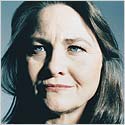
Best Performance
Cherry Jones
‘Doubt’
Any number of actresses could have found the steel in Sister Aloysius, the stern principal in John Patrick Shanley’s Doubt. It took Cherry Jones to find the woman’s gentleness and aching humanity. For this longtime fixture of the New York stage, the highest praise that can be offered is that this year, she managed to outdo even herself.
2 Liev Schreiber
Glengarry Glen Ross
As Richard Roma, the oiliest of David Mamet’s oily real-estate salesmen, Schreiber delivered a flawless performance. He deftly navigated the ego outbursts and flights of Mametspeak, never once ruffling his mustache.
3 Henry Stram
See What I Wanna See
Playing a priest who loses his faith, an actor risks falling into clichés. Yet Stram gave his character an anguished transparency—even at his most bitter, the pain he nursed kept him sympathetic.
Best Breakthrough*
Dan Fogler
A sinus condition has never been so funny. As the nerdy kid speller in respiratory distress in The 25th Annual Putnam County Spelling Bee, Fogler showed Broadway what downtown has known for years: He’s a relentlessly funny actor.
2 Remy Auberjonois
The Intelligent Design of Jenny Chow
Rolin Jones’s freewheeling comedy went to some strange places, and Auberjonois nailed the hilarious oddball lurking in every one of them. As a profanely sputtering computer scientist, he delivered a memorable tirade about the twin burdens of living in New Haven and being poisoned by Thai food. It may have been the single funniest speech of the year.
3 Lily Rabe
Colder Than Here
An understated turn in Steel Magnolias suggested Rabe might be a talent to watch; here, her affecting portrayal of the troubled daughter of a dying mother confirmed it. Already she has grace and force—a rare combination.
*Not “debut,” because these people have all been onstage before—but these were likely career-changing performances.
The Short List
Best Scene
Cherry Jones and Brían F. O’Byrne, ‘Doubt.’ Did he molest the boy or didn’t he? This clash of acting titans gave John Patrick Shanley’s play its impossibly intense shouting match at the climax:
Father Flynn: You have not the slightest proof of anything.
Sister Aloysius: But I have my certainty …
Father Flynn: You have no right to step outside the Church!
Sister Aloysius: I will step outside the Church if that’s what needs to be done, though the door should shut behind me! I will do what needs to be done, Father, if it means I’m damned to hell!
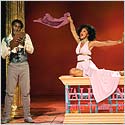
Best Performer Crying Out for Roles Worthy of Her Talent
Renee Elise Goldsberry, whose acting and singing in supporting roles in Two Gentlemen of Verona and The Color Purple nearly redeemed both shows.
Best Song
“Let’s Walk,” a lovely little duet by Victoria Clark and Mark Harelik from The Light in the Piazza.
Best Great Performance New York Missed
Alvin Epstein’s King Lear at Actors’ Shakespeare Project in Boston. The mad scenes by the cliff, when Lear has lost his mind and kingdom, were a triumph of classical acting: How did the city’s artistic directors let this happen in Boston and not here? (Runner-up: Jane Krakowski’s delightfully flighty Miss Adelaide in Guys and Dolls on the West End.)
Best Feud
Michael John LaChiusa’s essay in Opera News about the death of the musical, Marc Shaiman’s outraged response in a Broadway chat room, and the impassioned discussion that followed. If only the critics would write so provocatively.
Best Opening Line
“Ladies and gentlemen, boys and girls, I am the greatest actor that has ever existed.” —Julian Bleach, ‘Shockheaded Peter’
Best three-Liner
“There is a cure for homosexuality.”
“What is it?”
“Fame.”
From ‘Manic Flight Reaction,’ by Sarah Schulman.
Best Triple Threat (Old Definition)
Sherie Rene Scott, who showed in Dirty Rotten Scoundrels that she’s a sparkling actor, singer, and dancer.
Best Triple Threat (New Definition)
Manoel Felciano, who as Tobias in Sweeney Todd showed he can act, sing, and play an array of musical instruments—sometimes simultaneously.
Best Theater Outside a Theater
Jack White’s whirling, howling, utterly mesmerizing stage persona, on full display at the White Stripes shows at Brooklyn’s KeySpan Park.
Best Long-Overdue Premiere
‘Walking Down Broadway,’ by Dawn Powell, a sharp 1931 comedy about young people freshly arrived in New York, dusted off for a world premiere by the Mint Theater Company.
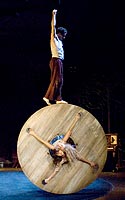
Best Physical Performer
James Thiérrée, the writer, director, and star of Bright Abyss, whose clowning and mime routines at BAM showed he would be a worthy heir to Charlie Chaplin even if the young Frenchman were not, in fact, his grandson.
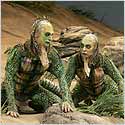
Best Costume Designer
Catherine Zuber, whose classic clothing brightened the wonderful A Light in the Piazza, whose dazzling lizard suits stole the show in the so-so Seascape, and whose intricate work was the only good thing about In My Life.
Best Workaholic
Doug Hughes, who directed five shows in New York in 2005, including Doubt and A Touch of the Poet. It would’ve been a better year if he’d directed ten.
Best Voice
T. Ryder Smith. Without singing a note, this downtown star showed once again he’s got the most distinctive pipes in town. His delivery—low but a little creaky, piercing but resonant—sounds as if it’s been beamed forward in time from a Gothic novel, which made him equally suited to Richard Foreman’s loopy The Gods Are Pounding My Head! and Anne Washburn’s gnomic fright show Apparition. (And his acting’s just as astonishing.)
Best “I’m Still Here” Display
Chita Rivera, 72, dancing on tables and singing lightning-fast medleys in her new biographical spectacle, The Dancer’s Life.
Best First-Act Curtain
The twisty, shocking “The Writer and the Writer’s Brother” story-within-a-story in ‘The Pillowman.’ The writer Katurian (Billy Crudup) narrates as backstage tableaux illustrate the horrors. When was the last time a Broadway audience screamed?
The Year of (Good) Timely Plays
Most nights, the quickest means of escaping the news is a theater: The lights go down, the curtain goes up, and the 21st century disappears. Who can resist being diverted by characters so happily unaware of the social and cultural tempests raging on the other side of the theater wall? And when playwrights do try to confront the contemporary world, they tend to philosophize or offer pat solutions, stranding us in the tedious world of the Issue Play. But this year, a striking number of fine writers successfully grappled with those tempests onstage. They dragged New York theater into the present.
No show did this better than Doubt. John Patrick Shanley’s Broadway triumph concerned a woman who refuses to compromise, or even acknowledge uncertainty, a depressingly common feature of American public life just now. (Not coincidentally, he started writing it shortly after the Iraq invasion.) Rinne Groff’s The Ruby Sunrise beautifully conveyed the chastened idealism of Generations X and Y, and the Presnyakov brothers’ Terrorism captured the particular dread that political violence inflicts on us at the moment. At the Lincoln Center Festival, Ariane Mnouchkine’s seven-hour Le Dernier Caravansérail offered an absorbing (if long-winded) view of the global refugee crisis.
Sometimes being current isn’t just a function of picking a timely theme—it’s a question of sensibility. In his radio play Hope Leaves the Theater, Charlie Kaufman writes about a woman who’s lonely amid all her gadgetry, hardly a novel subject for audiences who must be reminded at the start of every performance to hush their cell phones. But his surprising narrative leaps and clever metatheatrics made the material seem fresh, captivating the audience anew. Michael John LaChiusa’s See What I Wanna See, which tells the story of a priest who lost his faith after 9/11, was one of the rare musicals that tried to address the way we live now. Far more often, this year’s musicals seemed disconnected from contemporary sounds and concerns. There’s a place for nostalgia and escapism on Broadway, of course, and the musical is often the place for it. But what Shanley, Kaufman, and LaChiusa showed us in 2005 is that the best plays delight their audiences precisely by refusing to escape their time.
— J.M.
The Industry Award
Scott Elliott, The New Group
The New Group does many things well: Choosing plays isn’t one of them. This year, the city was hardly crying out for another revival of Hurlyburly, David Rabe’s overlong examination of Hollywood debauchery, or Abigail’s Party, Mike Leigh’s middling satire about British suburbia. But in the hands of artistic director Scott Elliott, those scripts (along with the New York premiere of the Presnyakov brothers’ bleak, unnerving Terrorism) formed the basis of a remarkably accomplished year. Though Elliott directed the Rabe and Leigh plays, he merits the award for his producing, for managing the season in its totality. The shows weren’t high-concept exercises, radical rediscoveries, or star vehicles (per se). The productions served the plays, thanks in large part to the exceptionally fine talent assembled to stage them. Elliott began with stars who can actually act, such as Ethan Hawke, who was magnetically watchable as a self-destructive talent agent in Hurlyburly; and Jennifer Jason Leigh, who showed a wonderfully odd charisma as an undersexed hostess from hell in Abigail’s Party. He surrounded them with first-rate stage pros (Lisa Emery, Elizabeth Marvel, Josh Hamilton), and added a brilliant discovery or two (Darren Goldstein, Elizabeth Jasicki). It all snapped together to form a coherent, compelling body of work, the most consistently rewarding of any in New York this year.